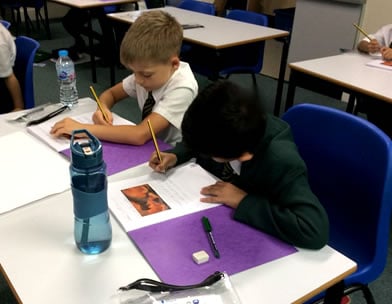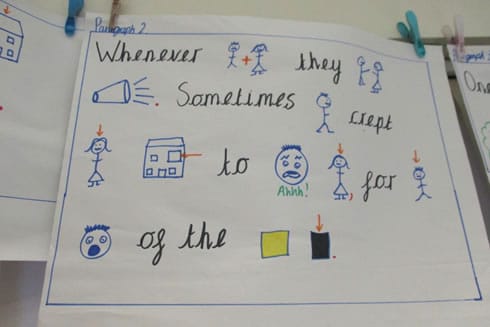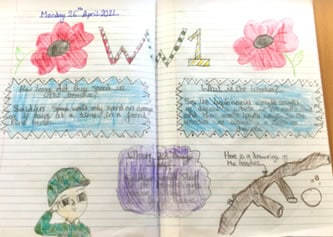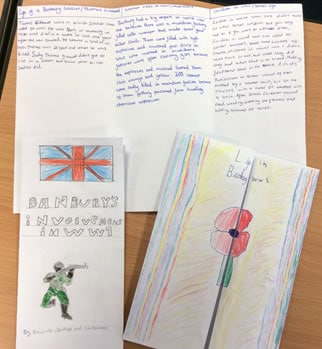English: Writing and Spelling
Writing: Intent, implementation and Impact
Intent:
At Dashwood Banbury Academy we want to create confident, independent and enthusiastic writers. We value the integral importance of writing and understand that whatever our children pursue in their futures, writing will be a part of that in some way. We want to prepare our children for life after school and are focused on tackling the social disadvantage. Our writing curriculum includes a broad and varied range of genres including: fiction, non-fiction and poetry. These are all carefully planned and interwoven throughout our units so that the pupils get a varied and broad writing curriculum enabling them to learn new skills and apply them across different contexts. We also ensure that writing opportunities extend across the curriculum, ensuring writing has a purpose and children experience being a writer. Using a Talk for Writing approach, pupils are encouraged to use language and talk to develop their vocabulary and sentence structures which, in turn, enables them to become proficient writers. We ensure writing opportunities are provided as soon as they first arrive in EYFS giving a strong foundation to build upon as they move through the school.
We want our children to develop a passion and a love for writing; we want them to develop their own style and be free to invent stories they love and are proud of. Our writing curriculum aims to provide children with cultural capital. We believe that our thorough writing curriculum is designed to enable children to leave our school with broad and deep writing experiences that will help them in their future.
Implementation:
We have a comprehensive writing curriculum that has a clear progression of knowledge and skills linked to the national curriculum.

- Writing will be taught daily in an approximately 3 week block of Talk for Writing. These units focus on a particular genre and encourage the children to embed the features needed for that genre of writing, whether that is non-fiction, fiction or poetry.
- Children will learn and orally rehearse a model text which includes all the features of this genre as well as including specific teaching points for that year group. Where appropriate these model texts will link directly with the terms topic.
- They will then move on to innovating and inventing their own story by changing the model text into a story of their choice, maintaining the features and key teaching points.
- Where appropriate children will sometimes present or polish their final piece of writing in a variety of formats. This gives the writing purpose and allows them to understand why they are writing. Writing can link to many other areas of the curriculum e.g. In year 4 when completing an explanation text on animals, pupils change their report into a documentary and record this on iPads with pictures and music.
- Targets are set for pupils at the start of each writing unit to allow children to know what they are aiming to achieve according to their individual and specific needs.
 Children will get the opportunity to write more across the curriculum through ‘I am an author’ pieces. These pieces of writing are not based on model texts but will use a genre the children have already been taught so they can refresh themselves on the features required.
Children will get the opportunity to write more across the curriculum through ‘I am an author’ pieces. These pieces of writing are not based on model texts but will use a genre the children have already been taught so they can refresh themselves on the features required.- These writing opportunities also make writing purposeful for children. g. in year 2 they use letter writing skills to write letters to the local council about protecting animals and their habitats. Or creating class anthologies about history topics or double page spreads about animals.
Intended Impact:
- Pupil voice will show that children enjoy writing.
 Children will establish strong identities as writers and writing will become a lifelong pursuit.
Children will establish strong identities as writers and writing will become a lifelong pursuit.- Books will show a wealth of experience in a variety of different genres of writing allowing them to use these as they progress in their education and life.
- Planning and books will show pupils leave Dashwood with the ability to write for a variety of purposes both for pleasure and for practical purposes g. letter writing.
- Books will show that pupils present their learning and share successes in a wide range of ways.
- Talk for Writing allows children to always have a clear model text to support their learning and enables children to innovate and invent their own stories on a spectrum of levels depending on their personal targets.
- Clear objectives will be used to measure progress against.
- Progress will be assessed through outcomes of assignments and a formative assessment will be given 3 x a year in our data collection points.
- Moderation trust wide will ensure data is accurate.

